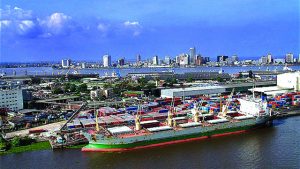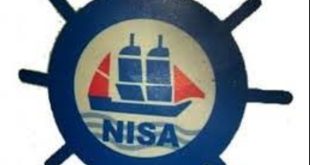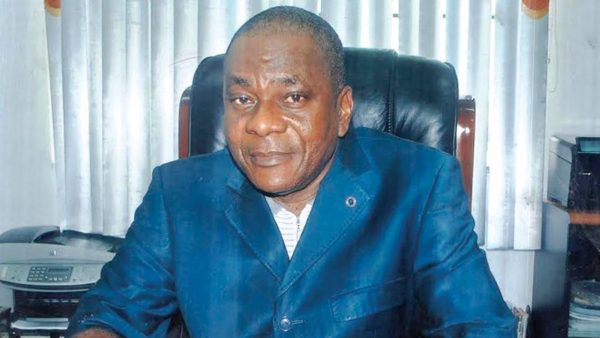
· NNPC, Ship Owners need roundtable to review trade terms – Iheanacho
· Vessel Attack: GoG summit communiqué will solve security woes – Akinsoji
By Kenneth Jukpor
While ship owners, shipping experts as well as maritime agencies have continuously plagued the Nigerian National Petroleum Corporation (NNPC) to change the trade terms for the carriage of the nation’s crude from Free on Board (FOB) to Cost Insurance and Freight (CIF), there are indications that NNPC may not wield authority to make such changes.
Experts also say that Nigeria may have to source new markets for its crude if it intends to get indigenous operators benefit in the carriage as the top buyers; India, United States of America and Spain according to NNPC figures in 2018, already have arrangement with foreign shipping giants for crude affreightment.
The NNPC report, which identified Nigeria’s crude destinations all through 2017, showed that India imported over 131 million barrels of Nigeria’s crude. United States was second at over 94 million barrels, while Spain was third largest importer with over 66 million barrels of Nigeria’s crude in 2017.

MMS Plus also learnt that the unfortunate incident of kidnapped nineteen crew members from a Greek-owned crude oil tanker ‘Nave Constellation’ attacked last week at about 142 kilometres (77 nautical miles) off Bonny Island, Nigeria, was carrying crude for Indian refiner Hindustan Petroleum Corp.
While Nigerian Maritime Administration and Safety Agency (NIMASA) and the Nigerian Navy has assured intensified efforts to rescued the victims, this shows the capital flight in crude affreightment which has become the norm in Nigeria.
Speaking with MMS Plus newspaper during an exclusive chat last week, a former sole administrator to the Maritime Academy of Nigeria (MAN) Oron, Engr. Olu Akinsoji admonished NNPC to explore other consumers of the nation’s crude who would be willing to allow Nigeria dictate the terms of carriage.
“There are many things attached to this issue of NNPC permitting Nigerians to carry crude. It is not really just a function of NNPC to allow. There has to be a shipping environment that would make it attractive for people to invest in ships. Look at Dangote and other major indigenous business persons who move huge cargoes frequently. Why haven’t they thought about investing in ships to convey these cargoes? It is because the environment doesn’t support such investments.”
Akinsoji, also a former Nigerian Alternate Permanent Representative to the International Maritime Organisation (IMO), stressed that NNPC had no clear-cut authority in the affairs of crude carriage terms.
“NNPC can’t give out contracts to people without ships and they can’t force people to own ships when the policy framework doesn’t support such business. If the nation had good policies that allow cargoes to be available to people who have monies to buy ships, people would buy ships to get this business.”
“However, the cargo isn’t available because we sell crude oil to people who already have arrangement for who to carry the crude. Some have signed arrangement with the ships to convey the crude before paying for the crude. So, that is the problem.”
Akinsoji equally lamented that NNPC’s shipping arm ‘NIDAS Shipping’ hasn’t been able to instigate policies to boost indigenous participation.
“British companies exporting goods have first priority for a British man to present his intentions to carry the cargoes. They don’t throw this opportunity to the whole world as we do in Nigeria. Nigeria generates cargoes but we aren’t in charge of the carriage. We can change the situation with policies that positions the nation to dictate the terms of carriage.”
“Some countries have tailored their policies to attract carriage of Nigerian cargoes better than Nigeria that owns the cargoes. When we dictate the carriage, we develop the capability of ship owners, they employ seafarers and we also improve shipping infrastructure and the human element. The government would also gain from tariffs that the indigenous operators would pay,” he added.
However, since no indigenous operator has benefitted from the NNPC shipping arm’s management of crude affreightment, ship owners have described the company as a wrong approach to address the lack of indigenous participation in the business.
The Chairman, Integrated Oil and Gas, Capt. Emmanuel Iheanacho shared this view last week, when responding to a question from our correspondent at the National Transport Summit organized by the Chartered Institute of Transport Administration (CIoTA) Nigeria.
Iheanacho, a former Minister of Interior, said: “NNPC re-floated NIDAS shipping; this means NNPC owns NIDAS. This is contrary to what we are advocating. We are advocating private sector involvement rather than government involvement in processes and businesses that the private operators do better.”
“If NIDAS Shipping thrives, it means some of the private sector shipping enterprises that have already established themselves would fall down. This isn’t what we want. Government should provide an enabling environment, encouragement, support and free competition to drive the growth of the industry and the structure of shipping to help the nation’s economy.”
Iheanacho also called for a strategic meeting between ship owners and the executive management of NNPC to ensure Nigerians participate in crude affreightment, stating that such meeting would avail ship owners an opportunity to inform NNPC of their capabilities while NNPC could explain their concerns.
“NNPC is managed by Nigerians and there is nothing difficult in arranging a meeting where crucial stakeholders could express themselves. Those Nigerians who know that they have the capacity to provide these services should say it. If NNPC has a contrary opinion, it should also say it. We really should have an opportunity to discuss these issues. It is very important that Nigeria should add value to its trade and the crude oil carriage is the easiest place to start with.” he added.
Nevertheless, a Governing Council member of the Nigerian Content Development and Monitoring Board (NCDMB), Mr. Mina Oforiokuma shared a distinct view as he told MMS Plus that NIDAS shipping wasn’t misplaced.
Mina, who is also the Managing Director, Sopetro Marine Limited, said: “NIDAS shipping is playing a great role because as an arm of NNPC, NIDAS shipping was created about 12 years ago as a joint venture between Nigeria and Daewoo Shipping. Daewoo Shipping moved out and NIDAS continued on its own as a shipping arm of NNPC. Today NIDAS is responsible for 100% of our import cargoes.”
“NIDAS charters most of the vessels coming in from Europe and the Far East with our gasoline cargoes to Nigeria. I must say that in October, 2018. NIDAS for the first time put themselves in a position whereby they became chatterers of those vessels. Prior to 2018, most of the cargoes that were coming in were just been nominated by our DSDP partners without any recourse to NIDAS. NIDAS, as the Nigerian arm is shipping the cargoes on behalf of their principal which is NNPC” he said.
In another development, as NIMASA and Nigerian Navy continues search for the kidnapped nineteen sailors, Engr. Olu Akinsoji has drawn the attention of the maritime industry to the communiqué from the recent global conference on the Gulf of Guinea organized by NIMASA in Abuja, Nigeria.
Akinsoji urged NIMASA to be at the forefront of the push for religious implementation of action points from the conference to put an end to the menace of insecurity on the nation’s territorial waters.
 MMS PLUS NG – Maritime, Aviation, Business, Oil and Gas News Online Newspaper with coverage in Maritime, Oil and Gas, Aviation, Power and Energy as well as Financial News
MMS PLUS NG – Maritime, Aviation, Business, Oil and Gas News Online Newspaper with coverage in Maritime, Oil and Gas, Aviation, Power and Energy as well as Financial News









